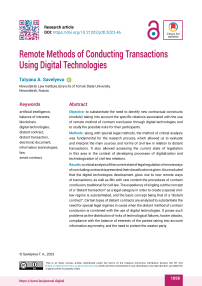Remote Methods of Conducting Transactions Using Digital Technologies
Автор: Savelyeva T. A.
Журнал: Journal of Digital Technologies and Law @lawjournal-digital
Статья в выпуске: 1 (4), 2023 года.
Бесплатный доступ
Objective: to substantiate the need to identify new contractual constructs (models) taking into account the specific relations associated with the use of remote method of contract conclusion through digital technologies and to study the possible risks for their participants. Methods: along with special legal methods, the method of critical analysis was fundamental for the research process, which allowed us to evaluate and interpret the main sources and norms of civil law in relation to distant transactions. It also allowed assessing the current state of legislation in this area in the context of developing processes of digitalization and technologization of civil-law relations. Results: a critical analysis of the current state of legal regulation of remote ways of concluding contracts is presented, their classification is given. It is concluded that the digital technologies development gives rise to new remote ways of transactions, as well as fills with new content the procedures of contract conclusion, traditional for civil law. The expediency of singling out the concept of a “distant transaction” as a legal category in order to create a special civil-law regime is substantiated, and the basic concept being that of a “distant contract”. Certain types of distant contracts are analyzed to substantiate the need for special legal regimes in cases when the distant method of contract conclusion is combined with the use of digital technologies. It poses such problems as the distribution of risks of technological failures, hacker attacks, compliance with the balance of interests of the parties taking into account information asymmetry, and the need to protect the weaker party. Scientific novelty: an attempt is made to define such concepts as a “distant contract” and a “distant transaction” and to identify their features. The expediency is substantiated of considering a distant contract as a separate legal construction (model) of the contract. Within this framework, a special legal regime should be developed and fixed, which can be extended to unilateral distant transactions. The problems of legal regulation caused by the use of information technologies are formulated, and legal constructions for their solution are proposed. Practical significance: the final conclusions and proposals can be used both in contractual practice by the participants of civil turnover and for the normative consolidation of the concept and features of “distant contract”, “distant transaction”. A special legal regime can be created, taking into account the specificity generated by the use of digital technologies.
Artificial intelligence, balance of interests, blockchain, digital technologies, distant contract, distant transaction, electronic document, information technologies, law, smart contract
Короткий адрес: https://sciup.org/14128459
IDR: 14128459 | УДК: 34:004:347.45/.47 | DOI: 10.21202/jdtl.2023.46


